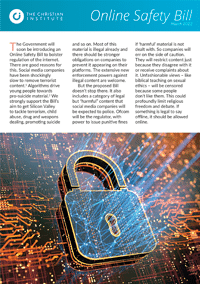The Government’s Online Safety Bill risks compromising freedom of expression, a group of Conservative MPs and Peers has warned.
Lord Frost is reported to be leading a revolt of Conservative Party members concerned about the far-reaching consequences of a poorly thought through Bill.
The Christian Institute has previously raised concerns that the Government’s push to clamp down on illegal and harmful content online could have unintended consequences, including censorship of Christian teaching.
‘Profoundly dangerous’
Lord Frost told The Daily Telegraph: “The Government would be wise to take a fresh look at the Online Safety Bill before beginning discussion in Parliament. Aspects of it present a real risk to freedom of expression in this country.
“It clearly hasn’t been properly thought through in all its aspects and it would be better to pause, have further discussion, and get things right.”
a real risk to freedom of expression in this country
Former security minister John Hayes said: “It is very important in the proper effort to control the excesses of the internet that we don’t allow free speech to be inhibited by woke prejudices about what views are acceptable.”
And Steve Baker MP said: “Some people will take offence at more or less anything – does that make it harmful? Once again, we see a lack of clarity that could be profoundly dangerous”.
‘Censor’s charter’
In its editorial, The Daily Mail remarked: “the unintended consequence of making social media firms responsible for policing ‘legal but harmful’ content is disastrous for freedom of speech.
“Lord Frost hits the nail on the head. Granting ‘woke’ Silicon Valley executives a censor’s charter makes them the arbiter of what views are considered acceptable – and which ones should be silenced.”
The Government states that its draft Online Safety Bill, which was published in May, will establish “a new regulatory framework to tackle harmful content online”.
Ministers say the proposals will restrict legal content that it deems ‘harmful’, with the definition of what constitutes ‘legal but harmful’ to be decided by the Government, Ofcom and the Silicon Valley giants.
‘Cancel culture’
Institute Director Colin Hart has warned that the Bill contains only a “very weak and ineffective duty” to uphold free speech, and asked: “Where will this leave mainstream Christian beliefs on sexual and medical ethics, gender, marriage and parenting?
“The Bill must be amended to include a presumption in favour of free speech. What is free to say on ‘the street’ must also remain free to say online.
“The legislation also proposes a new criminal offence for communication deemed ‘likely to cause harm to a likely audience’. This risks putting harm into the eye of the beholder.
“Any approach that prioritises the claims of the ‘offended’ is dangerous, particularly when the ‘likely audience’ for online content could be anyone in the world. The Bill risks enshrining cancel culture into law.”
The Government has introduced an Online Safety Bill to bolster regulation of the internet. It risks unfashionable views – like biblical teaching on sexual ethics – being censored because some people don’t like them. This could profoundly limit religious freedom and debate. If something is legal to say offline, it should be allowed online.


